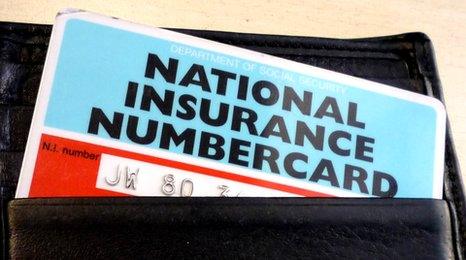Why do we pay National Insurance?
- Published

National Insurance is turning into a key election issue
If you have a job, then you pay National Insurance.
It is taken out of your salary depending on how much you earn, similar to income tax.
But because it isn't called a tax, governments can say they haven't increased income tax even though they've put up National Insurance.
Labour is planning to increase how much both employers and employees pay.
The Conservatives claim that will damage business and say they will scrap the rise.
So what is National Insurance and how does it work?
History
National Insurance payments were introduced in 1911.
The idea was to provide a government safety-net for workers who fell on hard times.
Employees paid money into the scheme out of their wages.
Anyone needing cash for medical treatment, or because they had lost their job, could claim from the fund.
What it is used for?
The system has changed over the years.
National Insurance is now used to pay for:
The NHS
Unemployment benefit
Sickness and disability allowances
The state pension
NI is supposed to be "ring fenced" - meaning the money raised is only used for these areas and won't be spent on things like building schools or employing police officers.
However, the government can borrow from the National Insurance fund to help pay for other projects.
How much do I pay?
If you work for a company:
On any money you earn between £110 and £844 per week - you pay 11%
If you earn more than £844 per week, there's an extra 1% added on top.
If you are self-employed:
A flat rate of £2.40 per week,
plus 8% of your profits between £5,715 and £43,875 per year.
If you are an employer:
You also pay into the scheme - 12.8% of an employee's salary.
Why are politicians arguing about NI?
Labour plans to increase National Insurance contributions by 1% for employees and employers. They claim that is needed to pay for public services during the recession.
The Conservatives say that will damage the economy and have the support of several high profile business leaders.
Instead they want to find extra cash from cutting "wasteful" spending.
The Liberal Democrats are also sceptical about the Conservative plan to freeze NI.